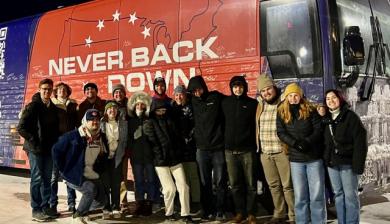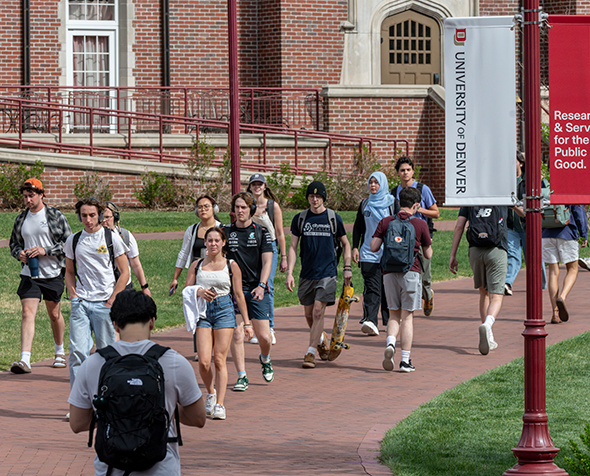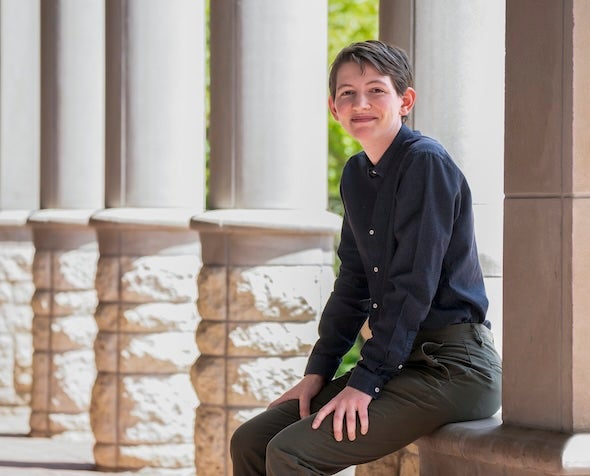How DU Teaches the Election
With Nov. 5 right around the corner, we look at how the presidential election has brought civics and civil discourse to life for students in political science classes.

Wading into politics in the classroom can be a messy business—much like democracy itself. But in this historic election year, DU political science professors have made sure students have real-time opportunities to get involved, make a difference and better understand the electoral process, all while listening to and learning from others’ viewpoints.
“When we study politics, we’re also studying civil society,” says assistant professor Jesse Acevedo. “Most people are not in interest groups, they’re not in institutions. Most people are just your everyday folks. Young people are also members of society who want to understand the world they are living in.”
Here’s a look at how Acevedo and others have approached teaching and learning about politics in 2024.
Laying the foundation
In the classroom, students come in looking for a greater understanding of what’s happening in politics and why. What they discover is our system is complex—but it’s also one in which they have agency.
“Some students come to class wanting to know answers. But I think it's just as important to know why we don't have all the answers,” says Acevedo, who teaches classes on comparative politics, Latin American politics and political economy. “So that's my approach—I want students to think about what we don't know about politics and what that tells us.”
As students are bombarded with nonstop political news, assistant professor Sara Chatfield, who teaches classes on American politics and the law and judicial politics, manages discussions about breaking news—whether it be about the election or a big Supreme Court case—by letting students take the lead.
“I’ll take a few minutes at the beginning of class and give the basic facts of what’s happened, and then open things up for discussion. I let them guide it—sometimes they want me to explain what happened in more detail or what it means, and sometimes they want to have dialogue among themselves,” she says.
Chatfield says that, even when students have strong opinions about an event or topic, she ensures that the classroom operates as a community, with established guidelines around being respectful and speaking with each other in a productive manner. “It can get emotional,” she says, “but never to the point of being uncomfortable.”
On the ground in Iowa
Back in January, Seth Masket, professor and director of DU’s Center on American Politics (CAP), and 13 students in his “American Presidential Nominations” class traveled to Iowa for the country’s first presidential primary contest, the Iowa caucuses.
Thanks to a partnership between the College of Arts, Humanities and Social Sciences and CAP, the students were able to attend caucus events big and small and get up close and personal with candidates, their staff, the media and caucus-goers. After each event, the group got together to talk about their experiences.
Rachel Padden, a senior majoring in public policy and strategic communications, called the experience both educational and exciting. “Being from a state that has a primary, it was exciting to see the caucus happen—the way they just vote right there by a piece of paper—and the anticipation of waiting to hear the votes being announced. It honestly made me want to caucus,” she told the DU Newsroom.
Getting out the vote
For the past two years, assistant professor Alena Wolflink has been teaching a class called “Radical Democracy,” which includes students registering voters on campus. Supported by a community-engaged teaching grant from DU’s Center for Community Engagement to Advance Scholarship and Learning (CCESL), the class partners with a nonpartisan nonprofit organization called New Era Colorado to help get out the vote.
The purpose of the class, says Wolflink, is for students to see the connections—and disconnections—between democracy in theory and in practice. “I want them to feel empowered to take action and participate in their own lives and in their own communities and to have more complex views of what it means to do that democratically.”
Participation is not always positive or easy—and she wants students to be OK with that. “Some of the less glamorous forms of action are often the most meaningful and effective,” Wolflink says, “so I think one of the most important things to do is figure out how to register voters, phone bank and knock on doors without getting overwhelmed, anxious or drained.”
Making a game out of it or having a party to celebrate what you’ve accomplished, she adds, is “a great way to get over some of the social and emotional hurdles of doing this kind of work.”
Former student and alumna Jacky Jimenez (BA ’23), who was in the first “Radical Democracy” class, told the DU Newsroom that the experience gave her a deeper perspective on “what democratic participation looks like and whose responsibility it is to engage citizens.”
As a first-generation student who previously registered voters in the Latinx community, Jimenez says that registering voters on campus was a unique opportunity “because the demographic we were targeting was different in age, background and political priorities. It was a great experience registering and recruiting my peers to vote because I had to rework my approach and usual talking points.”
A reason for optimism
Beyond their engagement at caucuses, on campus and in classroom discussions, students like Padden and Jimenez are deeply curious about politics and seriously thinking about the significant political issues of our time. Acevedo sees this in his political inquiry class.
“The research proposals I see from my students, on things like how to improve voter turnout and how to make public opinion more inclusive, are some of the most impressive things I see at DU,” he says. “Students are very passionate, very clever, very creative. It gives me a lot of hope for the younger generation coming up.”











